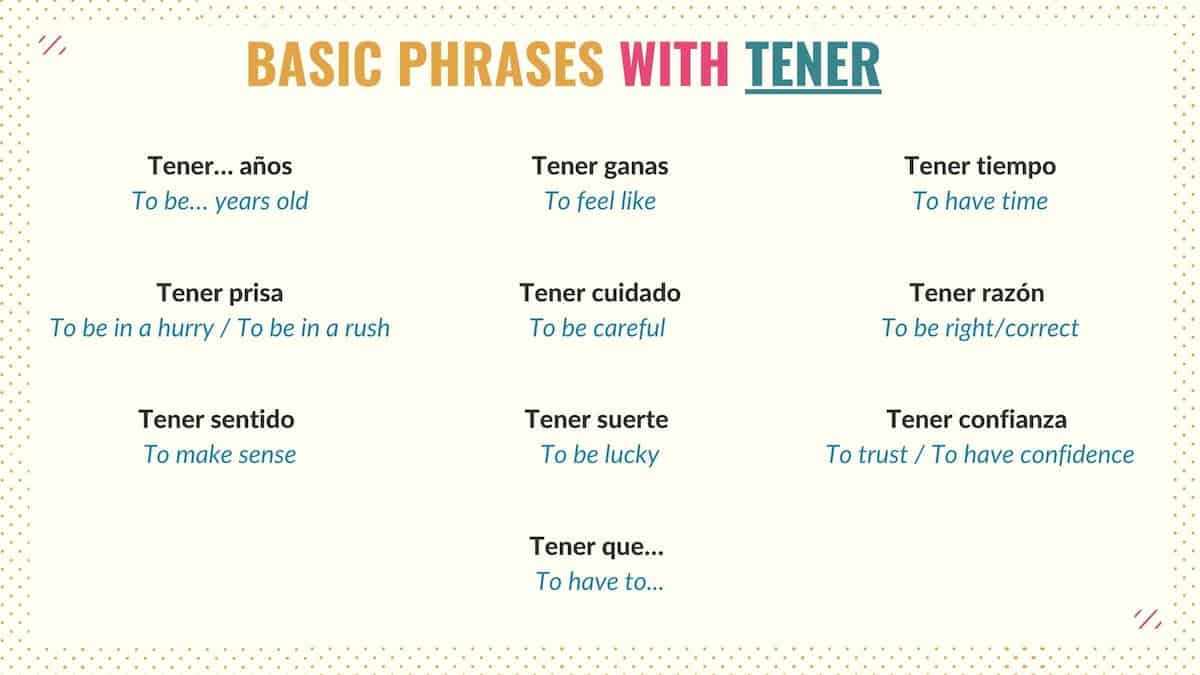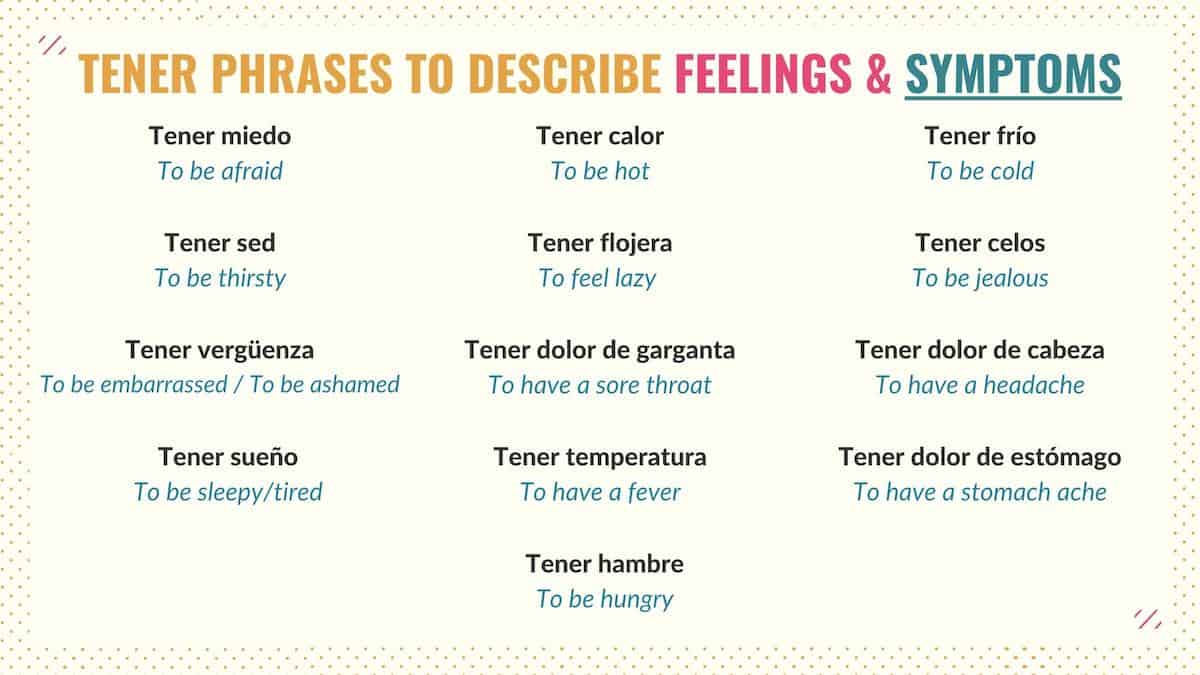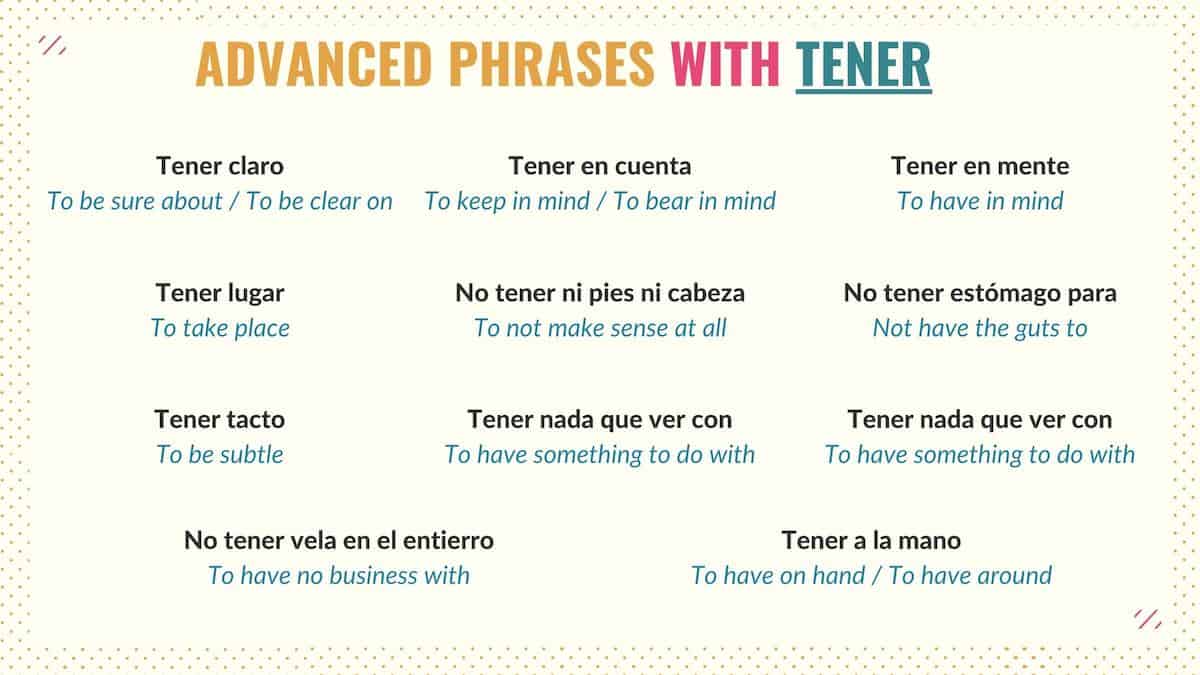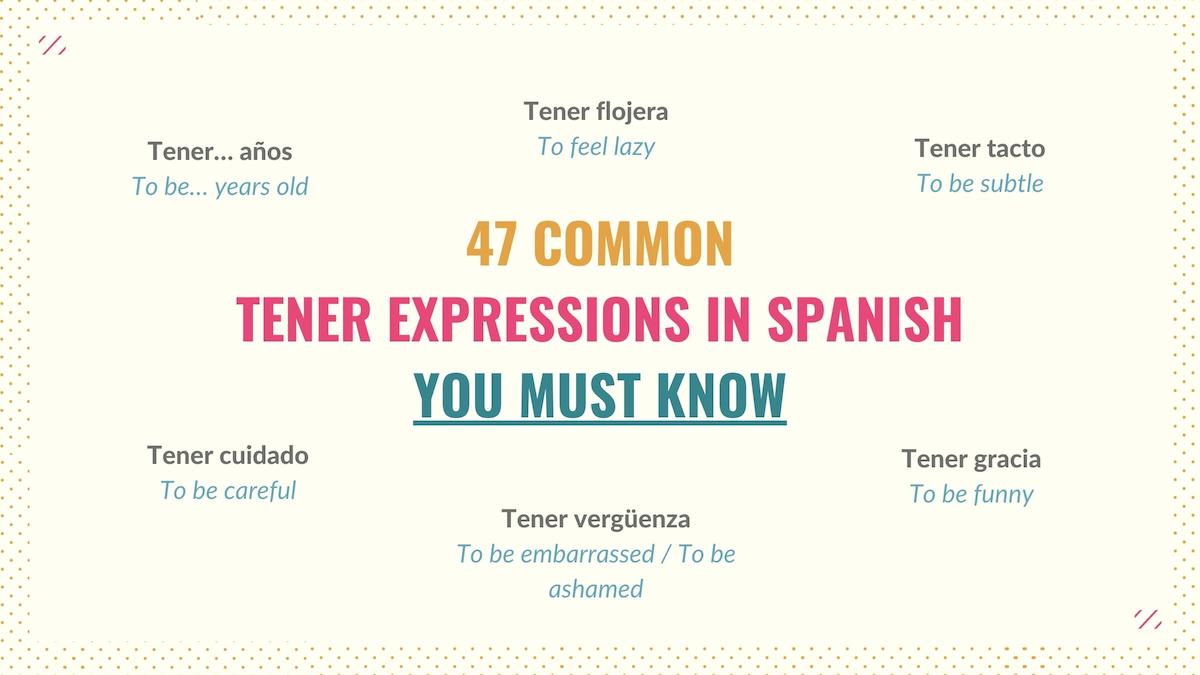The verb tener is one of the most basic verbs in Spanish. But did you know that there are many expressions with this verb that can help you express your ideas more effectively and naturally?
When learning Spanish, idiomatic expressions are a must if you’re serious about improving your conversational skills. So, in this article, you’ll learn the most common phrases with ‘tener’. To make this easier, I’ve divided these expressions into:
- Spanish Expressions for Beginners
- Expressions to Describe Feelings & Symptoms
- Advanced Tener Expressions
- Downloadable PDF
You can certainly incorporate all these tener expressions into your vocabulary. Just ‘ten en cuenta’ (keep in mind) that some of these phrases may be more complex than others.
Tip: Spanish idiomatic expressions don’t have literal translations. As a result, many of these tener expressions won’t be translated as ‘to have’.
Spanish Tener Expressions for Beginners

Here are some starter tener phrases that beginners must know when learning Spanish:
- Tener… años – To be… years old
- Tener ganas – To feel like
- Tener tiempo – To have time
- Tener prisa – To be in a hurry / To be in a rush
- Tener cuidado – To be careful
- Tener razón – To be right/correct
- Tener sentido – To make sense
- Tener suerte – To be lucky
- Tener confianza – To trust / To have confidence
- Tener que… – To have to
In Spanish, we use the formula tener + number + años to say someone’s age:
[‘Tener’ conjugated] + [number] + años
Charlie tiene doce años.
Charlie is twelve years old.
Tú tienes treinta años.
You are thirty years old.
Here are more examples of the remaining tener expressions. Notice that tener ganas can be used to talk about things or activities you feel like doing:
¡Oigan, tengan cuidado!
Hey, be careful, guys!
Para mí esto no tiene sentido.
To me this doesn’t make sense.
Evelyn y Tony tienen ganas de ir al cine.
Evelyn and Tony feel like going to the movies.
Tener Phrases to Describe Feelings & Symptoms

In Spanish, many tener expressions are used to talk about a person’s feelings or symptoms. As you can imagine, these phrases are very useful when describing your physical or emotional state to others, going to the doctor, or other similar contexts. Most of these expressions with tener are translated as ‘to be’.
- Tener miedo – To be afraid
- Tener calor – To be hot
- Tener frío – To be cold
- Tener sed – To be thirsty
- Tener flojera – To feel lazy
- Tener celos – To be jealous
- Tener vergüenza – To be embarrassed / To be ashamed
- Tener dolor de garganta – To have a sore throat
- Tener dolor de cabeza – To have a headache
- Tener dolor de estómago – To have a stomach ache
- Tener temperatura – To have a fever
- Tener hambre – To be hungry
- Tener sueño – To be sleepy
Here are some examples of how to use these expressions with ‘tener’:
Tenemos miedo de equivocarnos.
We’re afraid of making a mistake.
El bebé tuvo temperatura.
The baby had a fever.
¿Tienes un suéter que me prestes? Tengo mucho frío.
Do you have a sweater that I can borrow? I am very cold.
Take Note: Notice that one of the most common uses of tener is to talk about possessions.
Advanced ‘Tener’ Expressions

Advanced idiomatic expressions with tener express more complex ideas. Although they’re still very common, you may not use them as often as the other expressions. This is because these phrases have more specific meanings.
- Tener claro – To be sure about / To be clear on
- Tener en mente – To have in mind
- Tener lugar – To take place
- No tener ni pies ni cabeza – To not make sense at all
- No tener estómago para – Not have the guts to
- Tener tacto – To be subtle
- Tener nada que ver con – To have something to do with
- No tener vela en el entierro – To have no business with
- Tener en cuenta – To keep in mind / To bear in mind
- Tener a la mano – To have on hand / To have around
- Tener ángel – To be charming
- Tener la culpa – To be one’s fault / To be to blame
- Tener cola que le pisen – To have skeletons in someone’s closet
- Tener gracia – To be funny
- Tener la palabra – To have the floor
- Tener pinta de – To look like / To have the appearance of
- Tener el sartén por el mango – To call the shots
- Tener entendido – To understand
- Tener agallas – To have the guts
- No tener abuela* – To be full of yourself / To be arrogant / To be very good
- Tener voz y voto – To have a say
- Tener el descaro – To have the nerve
- Tener en la punta de la lengua – To have on the tip of your tongue
- Tener la soga al cuello – To be up to your neck
- Tener a alguien comiendo de la palma de tu mano – To have someone eating out of the palm of your hand.
*Note: In Mexican slang, no tener abuela is also used to say something is very good. However, this meaning is only applicable to Mexican Spanish.
Here are some sentences using these tener phrases in Spanish:
Ten tu pasaporte a la mano.
Have your passport on hand.
Estos tacos no tienen abuela.
These tacos are very good.
Carlos tuvo el descaro de venir a pedirme ayuda.
Carlos had the nerve to come to ask me for help.
Ustedes tuvieron la culpa de que perdiéramos el avión.
It’s your fault that we lost the plane.
Tengan en cuenta que el proyecto es para mañana.
Keep in mind that the project is due tomorrow.
Take Note: Tener is the direct translation of ‘to have’ in many contexts. However, we do not use ‘tener’ when forming perfect tenses, such as the present perfect. In this situation, we use the verb ‘haber’. If you have questions about these verbs, check my guide on the difference between haber and tener in Spanish.
Next Steps with the Verb Tener
You’ve now learned a lot of new vocabulary and Spanish grammar structures using the verb tener. Now it’s time for you to apply these phrases to your conversations. If you need to practice the conjugations of ‘tener’, you can check out the conjugation guide or take this quiz. ¡Buena suerte!
Download the Spanish Expressions Using Tener PDF Cheat sheets
Learning all of these tener expressions will take time! Whether you’re a beginner, intermediate or advanced speaker a list of this many phrases can be a lot to memorize. Feel free to download a copy of the PDF cheat sheets which include all 47 expressions!



